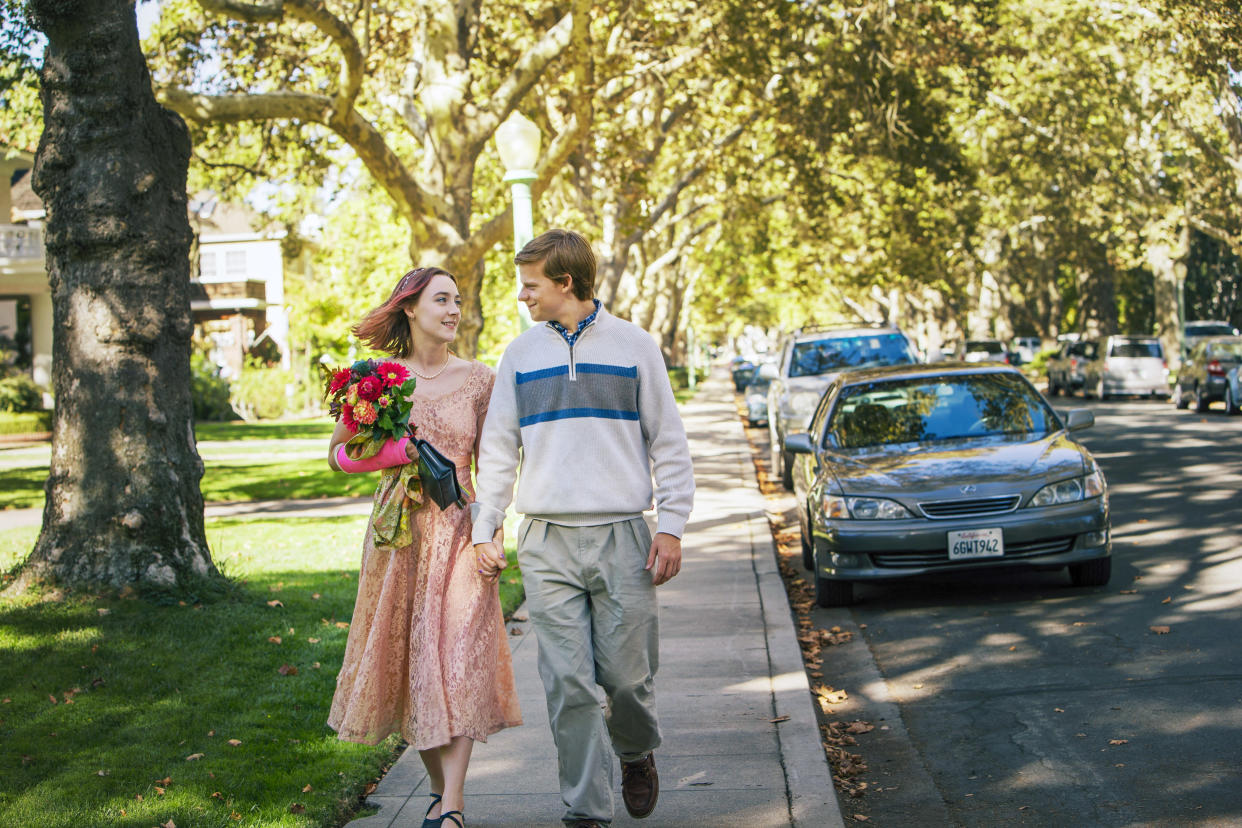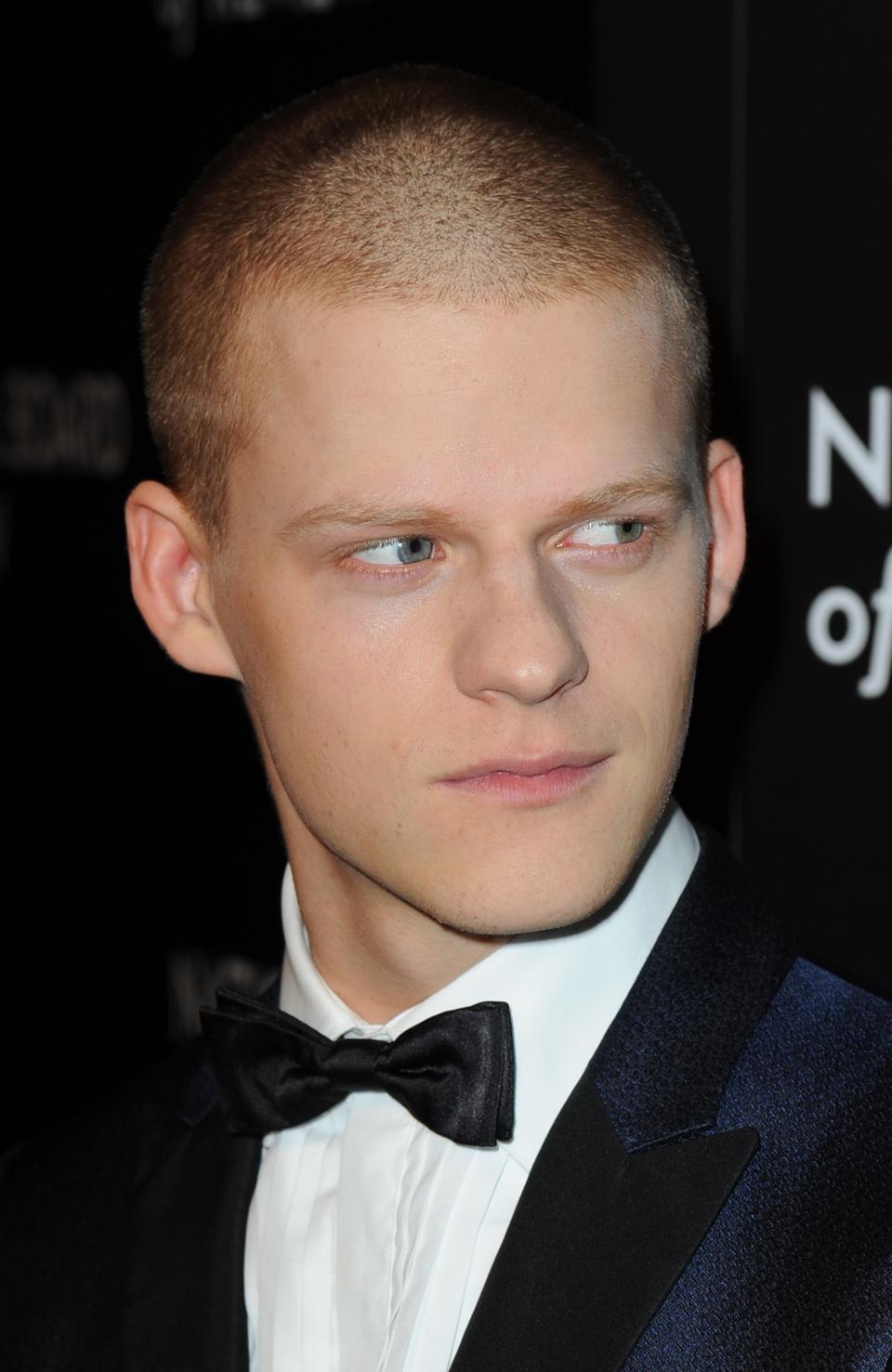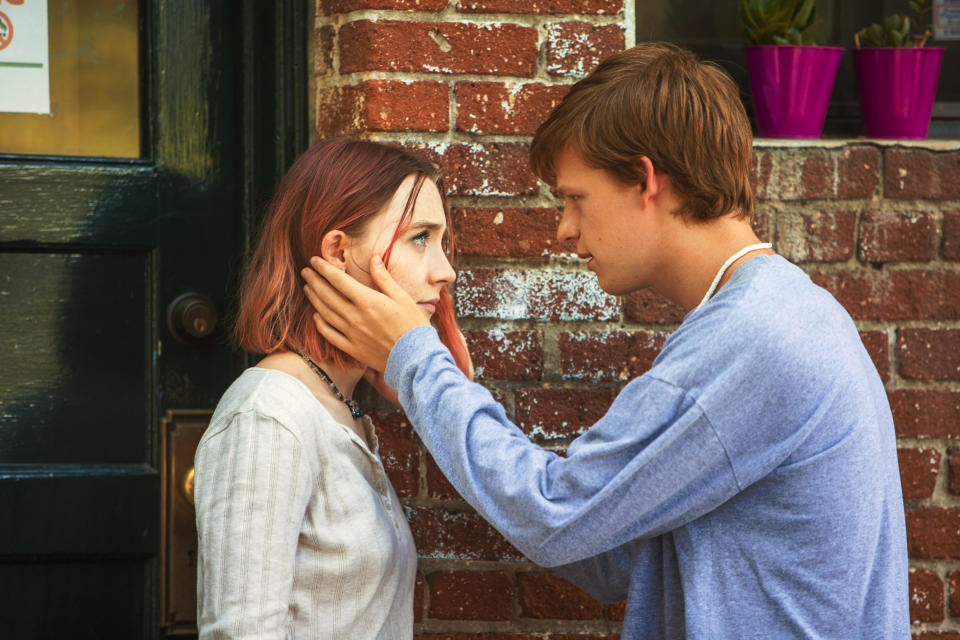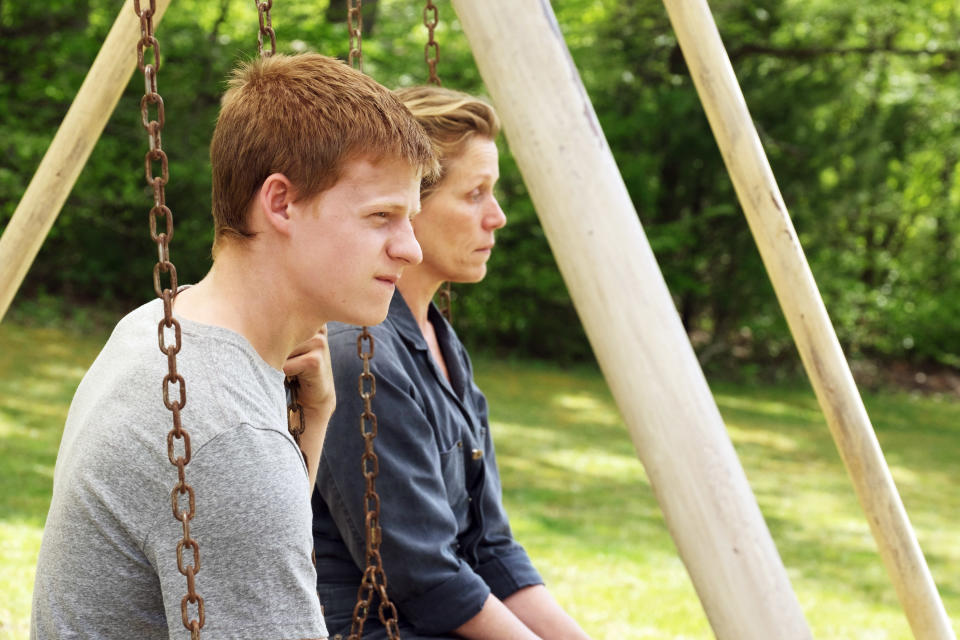'Lady Bird' and 'Three Billboards' star Lucas Hedges on 'magical unicorn' Saoirse Ronan and his faux rivalry with Timothée Chalamet

In Greta Gerwig’s coming-of-age film Lady Bird, Lucas Hedges performs a jubilant number from Into the Woods, dances in a rose garden with Saoirse Ronan, and collapses into giggles while microwaving late-night snacks with his friends. Anyone who saw Hedges’s Oscar-nominated performance as a grieving son in 2016’s Manchester by the Sea will recognize this as a dramatic shift in tone — which is just what the 21-year-old actor was looking for, he told Yahoo Entertainment. Hedges plays Danny, a Catholic high school senior in Sacramento in 2002, who becomes the first boyfriend — and first heartbreak — of the title character, played by Ronan. It’s one of two memorable minor roles Hedges took on in 2017, the other being Frances McDormand’s son in the darkly comic crime film Three Billboards Outside Ebbing, Missouri. Neither part is big enough to merit the awards-season attention Hedges received last year, but he’s fine with that. Instead, he’s enjoying the experience of watching his friend (and Lady Bird co-star) Timothée Chalamet garner the same kind of buzz for his performance in Call Me by Your Name. When Yahoo spoke with Hedges in late November, Chalamet had just won the Gotham Award for Breaththrough Actor, the category in which Hedges was nominated in 2016. The thoughtful and humble Hedges talked to Yahoo Entertainment about making Lady Bird, compared the acting styles of Ronan (“a unicorn”) and McDormand (“iconic”), and shared the personal hazards of living through awards season (“I started losing track of reality”).
Yahoo Entertainment: Thanks for taking the time to talk to me! I was just watching Timothée Chalamet’s Gotham Awards speech—
Lucas Hedges: Oh my God! Wait, that’s so funny. I just saw it, too! Isn’t it amazing? [Laughs.] It’s hilarious. I texted him about it last night and was like, “Dude, that was so funny and amazing and eloquent, and you’re killing it.’”
Well, I was thinking about you, because in an interview with Vulture about your great run of films, you said something like, “I’m not having Timmy Chalamet’s year or anything.”
[Laughs.] I know, I know.
I mean, I wouldn’t put it that way! But do you feel like he’s going through some of the things you went through last year?
Oh, to-tally. The joke that I have with Timothée, or the joke that we have together — hopefully I’m not throwing him under a bus right now — is that we’re both so threatened by each other. We’re both like, “Dude, I’m so threatened by you!” “What? I’m so threatened by you!” But we have such a great friendship because I have so much respect and love for everything he does, and I’ve just come to really love him as a friend and as an artist. But as far as I’m concerned, he’s having an even crazier year than I did. He just won a Gotham Award for the category that I was nominated in, and he’s on the cover of all these weird magazines. I mean, he’s becoming like, this crazy icon [laughs]. And I can’t say that that happened to me.
You’re the face of Dior. I feel like you’re underselling yourself a little bit.
Oh, OK. I have a history of doing that to myself so you may be right. But I feel like I’m grateful that he’s going through this because it makes me feel less alone.

I always wonder about how people process these experiences of fame. You can’t Google “how to handle losing an Oscar,” “how to handle winning an Oscar;” even “what do I bring to the Oscars?” Do you feel like you need to warn Timothée about anything or prepare him for anything?
You know, there’s a part of me that wants to be like: Meditate every day. Do yoga. Really get clear with who you are. But I can’t tell him that because that’s not what I did, and I really just think he should live it and do whatever he wants to do. And what I mean by that is not “go crazy,” but just — you’re a good person, and do whatever feels natural to you in these moments. If you want to go out and celebrate, go celebrate. You deserve to celebrate! And he is 21, so he [can] have a drink; don’t lose control. And if you do feel like you’re on the verge of losing control, then start meditating [laughs] and take care of yourself. But I do think it’s a time to actually celebrate.
And if there ever comes a day that I go through that again — I just think it’s kind of hard, and I started losing track of reality. When most of your conversations are interviews and you’re thinking about, just how everything you do is perceived, then how every word that comes out of your mouth is filtered through an interview lens — it gets complicated and confusing. And it sort of becomes plastic. So I guess maybe I have advice for him? But I feel like I’m in the same position as him still. I have no idea what I’m doing, still.
I talked to Greta a couple weeks ago about how she created the environment on set, and how she conveyed the idea of what it was like to be a teenager before everyone had cellphones and fast internet. How did you wrap your head around that idea? I know she makes you put away your phones.
For the two years before this year, I had a flip phone. I was living with a flip phone when I got offered the part, just because I was on my iPhone way too much. I’ve also gone entire periods of my life without having a phone, so it’s hard to imagine a world without it, but I know what it’s like to live without it. Oh, but then again it’s the time before flip phones — even a flip phone is futuristic! [Laughs.] But I also feel like that’s kind of insignificant when it comes down to playing the part. … It’s not about the fact that I don’t have a phone; it’s about: What do I want as a human being? Ultimately, the movie could take place at any time, anywhere.
One of the themes in the film is Lady Bird wanting more than her parents gave her. When I was growing up in the suburbs, I was in awe of kids like you, who have glamorous artsy parents and live in the city. So was that idea something that you could connect to at all?
[Laughs.] It’s so interesting because I grew up in Brooklyn; my dad’s a filmmaker. My parents aren’t celebrities or anything, but I grew up with the life that someone who didn’t live in New York City, who’s an artist and wants to be an actor, would long for. And I spent my entire childhood longing for, of course, another life. I just wanted to live in England and have English parents. So it’s weird how we always find the thing that we don’t have. It’s sort of the obvious cliché; the grass is always greener thing. But yeah, part of the reason why I wanted to be an actor in movies is so I could escape the world that I grew up in — not because it was uninhabitable or dangerous, it was a very safe place, but because there’s always somewhere more magical. And I’m only now beginning to love where I’m from, weirdly, and only now am I getting really grateful for the parents that I have. But I’m always sort of trying to find my way out of what I was born into, which is just weird. Like even now — like you said, I did get nominated for an Academy Award, but there’s still a part of me that’s like, “Well I’m not having Timothée Chalamet’s year!” [Laughs.]
J. Cole did this great song called “Love Yourz”, which is just an amazing song about how you’re never going to be happy until can you figure out how to love the life that you have. And he really — he has some great lyrics; you should listen to it. It’s a really beautiful song. I can hear it in my head right now.
There’s a lightness in your performance in this film that’s really lovely to see. There are light moments in Manchester, but having been introduced to you through that, it’s nice to see you, for example, juggling French fries.
[Laughs.] Oh yeah, that’s funny! Have you seen the movie more than once? Because that happens in the blink of an eye. Yeah, that was one of the reasons why I really — well, one, I got to have a love storyline with Saoirse Ronan, who’s just the most amazing actress, and that was one of the things that really drew me to doing the movie to begin with. But also, it is very light and it is very fun, particularly the musical theater aspect to it, which I wanted to do so badly. And I’m not a singer, but I love the idea of singing, and just committing yourself wholeheartedly to something. And giving yourself over to it even if it is really stupid — like even if you’re part of a stupid high school theater production, there’s something amazing and so earnest about giving yourself over to that, which I really wanted to do.

I imagine the set being like a giant high school cast party.
It truly was. I was saying in an interview earlier today that I’d go over to Beanie’s house and we’d watch The Bachelor and The Bachelorette. It just felt like summer camp. It was essentially the summer in Los Angeles a year ago, and I had never really lived in L.A. before, and it just felt like a new realm of experiences and excitement and fun. And, God, I’d give anything to do it all over again.
Both times I saw the film, my immediate reaction when it ended was to think, No, keep going!
I hear that they’re doing a Call Me by Your Name sequel, so they should do a Lady Bird sequel. [Laughs.]
I’m going to ask you a difficult question that I’m not sure anyone else could answer: How does the experience of doing a scene with Saoirse Ronan compare to doing a scene with Frances McDormand?
Interesting! (Deep breath.) Well you know, it’s so bizarre, because ultimately — I mean, I’m still so new to acting, but it’s like, how do you exist with two different human beings? Like when you meet one person who’s entirely different from another person, it’s not going to be the same; it’s going to be entirely different. It’s the reason why we have some friends and not others, it’s the reason why we marry one person and don’t marry the other. So getting to act with Saoirse was a completely different world from getting to act with Frances, because they’re completely different people at completely different stages of their lives. I mean, Frances in Three Billboards is sort of like this iconic figure who’s broken and is fighting for what she believes in to the point of — she’ll fight till her death. And that’s kind of, I think, true for who Frances is. I think Frances represents a lot of what Mildred represents. And Saoirse is a unicorn. Saoirse is like this majestic creature from a far-off land, and I think that’s true even when she’s playing a girl from California. She is a unicorn even then. The thing that stands out for me of getting to work with Saoirse is her eyes. She just has the most magical eyes, and you can get everything from looking into her eyes. And that’s sort of my experience working with both of them.

Three Billboards is much more emotionally intense in a lot of ways.
But it’s also very funny. That was very apparent from the script … that it was sort of dark and twisted in its humor. It’s also crazy that this movie was written and made way before Trump became president — not that it has anything to do with the president, but the craziest stuff is happening in America and it’s very timely. I have no idea how to really take in any movie that I’ve been in, just because I don’t know how to divorce it from the experience of making it, but I wonder what it’s like for people to see that movie right now.
When you have those intense, emotional scenes — the scene where you’re holding a knife to John Hawkes’s throat in Three Billboards, even the coffee shop scene in Lady Bird — how do you get yourself into that head space?
I’m still learning how to get into the head space of those scenes. But music is really big for me; music can get me lost in a world very easily and bring me back to a time in my life that’s similar to the one I’m exploring in the scene. And also just energizing my body; really moving around and getting my breath going and activating my solar plexus. It’s a lot of sort of boring actor-y things that help me a lot. I lean on music most of all though.
Read more from Yahoo Entertainment:


